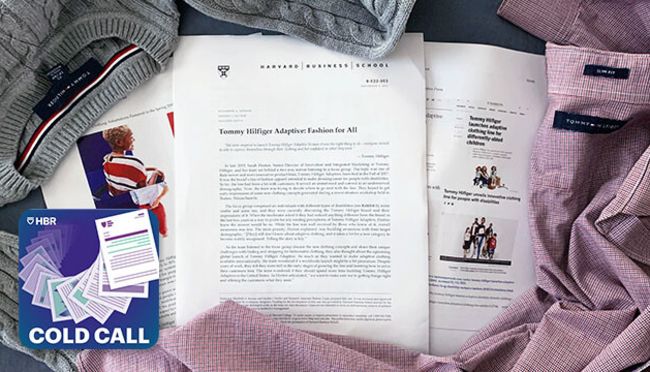Marketing Communications →
→

- 05 Dec 2023
- Cold Call Podcast
Tommy Hilfiger’s Adaptive Clothing Line: Making Fashion Inclusive
In 2017, Tommy Hilfiger launched its adaptive fashion line to provide fashion apparel that aims to make dressing easier. By 2020, it was still a relatively unknown line in the U.S. and the Tommy Hilfiger team was continuing to learn more about how to serve these new customers. Should the team make adaptive clothing available beyond the U.S., or is a global expansion premature? Assistant Professor Elizabeth Keenan discusses the opportunities and challenges that accompanied the introduction of a new product line that effectively serves an entirely new customer while simultaneously starting a movement to provide fashion for all in the case, “Tommy Hilfiger Adaptive: Fashion for All.”

- 26 Oct 2022
- Research & Ideas
How Paid Promos Take the Shine Off YouTube Stars (and Tips for Better Influencer Marketing)
Influencers aspire to turn "likes" into dollars through brand sponsorships, but these deals can erode their reputations, says research by Shunyuan Zhang. Marketers should seek out authentic voices on YouTube, not necessarily those with the most followers.

- 29 Oct 2020
- Research & Ideas
The COVID Gender Gap: Why Fewer Women Are Dying
To promote the greatest safety, public health officials should target their pandemic messaging to men differently than to women. Research by Vincent Pons and colleagues. Open for comment; 0 Comments.

- 15 Oct 2019
- Working Paper Summaries
Vote Choice Formation and the Minimal Effects of TV Debates: Evidence from 61 Elections in 9 OECD Countries
This study of 61 elections around the world finds that vote choices aggregate a lot of information obtained during the electoral season, but the contribution of TV debates to this process is negligible.

- 04 Oct 2019
- Working Paper Summaries
Soul and Machine (Learning)
This paper argues with examples and predictions that while marketing science theory, engineering, and machine learning capabilities are changing the way we think about marketing, true advances will come when marketing managers know when to trust the machine and when to trust their instincts.

- 11 Mar 2019
- Research & Ideas
Branding Sells Cereal, Handbags, and Vacations. Can It Sell a Country?
Countries such as Israel now realize they need to engage in public diplomacy as well as foreign diplomacy, and in place branding, not just political advocacy, says Elie Ofek. Open for comment; 0 Comments.

- 07 Mar 2019
- Working Paper Summaries
Calculators for Women: When Identity Appeals Provoke Backlash
With calculators targeted to women and laundry products aimed at men, examples of identity-based labeling—or “identity appeals”—abound in advertising and marketing. Five studies show when and why such identity appeals backfire. Identity appeals may fail equally whether they evoke negative or just milder stereotypes.

- 18 Jun 2018
- Research & Ideas
Warning: Scary Warning Labels Work!
If you want to convince consumers to stay away from unhealthy diet choices, don't be subtle about possible consequences, says Leslie John. These graphically graphic warning labels seem to do the trick. Open for comment; 0 Comments.

- 19 Oct 2017
- Research & Ideas
How Charitable Organizations Can Thwart Excuses for Not Giving
Charitable organizations provide all kinds of reasons for donors to give money—but sometimes their messaging does just the opposite, shows research by Christine Exley. Open for comment; 0 Comments.

- 09 Oct 2017
- Research & Ideas
Fearing Fox News, Democratic-leaning Companies Delayed Negative Announcements
Jonas Heese and Vishal P. Baloria explore strategies used by companies to reduce the risk of potentially negative press, focusing on Fox News and the 2000 presidential election. Open for comment; 0 Comments.

- 08 Nov 2016
- Working Paper Summaries
Managers' Cultural Background and Disclosure Attributes
How does the cultural background of executives affect the way in which they communicate with investors? This paper examines the impact of cultural backgrounds of individual managers based on their ethnic heritage on their disclosure narrative during earnings conference calls. Among the findings, managers from individualistic cultures are likely to use a more positive tone, use greater self-reference, and make fewer apologies in the Q&A portion of the conference calls. The capital market reacts to disclosure style in a predictable way: optimistic tone is associated with a positive stock return following the call. However, market participants do not adjust their interpretation of disclosure tone for firm value based on the cultural background of the management team.
- 29 Jan 2013
- Research & Ideas
Creating the Perfect Super Bowl Ad
Professor Thales S. Teixeira says TV viewers lose purchasing interest when ads get too caught up in entertainment. His advice for the perfect pitch: tie together a good story and a compelling brand. Closed for comment; 0 Comments.
- 09 Feb 2012
- Sharpening Your Skills
Sharpening Your Skills: Online Marketing
In this collection from our archives, Harvard Business School faculty discuss the latest research on online marketing techniques, including consumer reviews, video ads, loyalty programs, and coupon offerings. Open for comment; 0 Comments.
- 27 Jul 2011
- Research & Ideas
Customer Loyalty Programs That Work
Thanks to ever-improving technology, customer loyalty programs are proving extremely popular among retailers—but merchants are not getting all they should out of them. The reason? Professor José Alvarez says retailers need to see customers as partners, not transactions. Key concepts include: Most retailers are at a very basic level in using loyalty programs, and many customers see the programs as punitive. Successful retailers connect with customers via loyalty programs at three levels starting with an introduction, followed by a retailer-initiated communication, and finally with customer- or retailer-initiated feedback loops. Retailers should ask themselves, How do I create a partnership with the consumer? Data collected from these programs can help merchants make smarter decisions on everything from where to open a new store to pulling the plug on a fading brand. Closed for comment; 0 Comments.

What Founders Get Wrong about Sales and Marketing
Which sales candidate is a startup’s ideal first hire? What marketing channels are best to invest in? How aggressively should an executive team align sales with customer success? Senior Lecturer Mark Roberge discusses how early-stage founders, sales leaders, and marketing executives can address these challenges as they grow their ventures in the case, “Entrepreneurial Sales and Marketing Vignettes.”